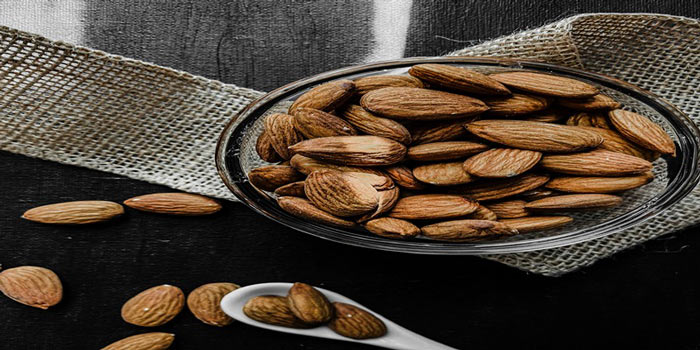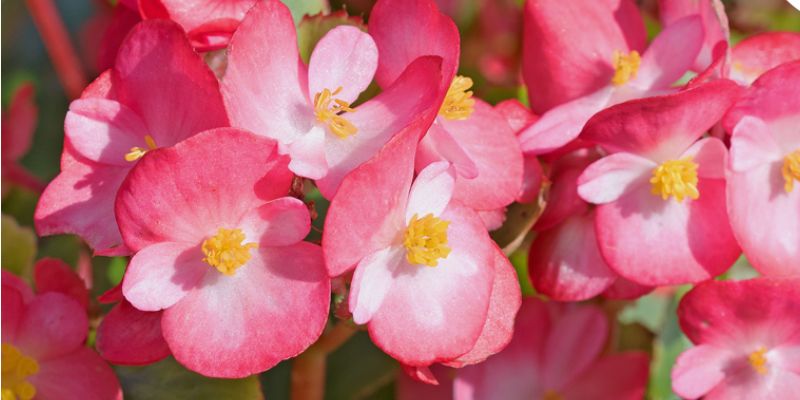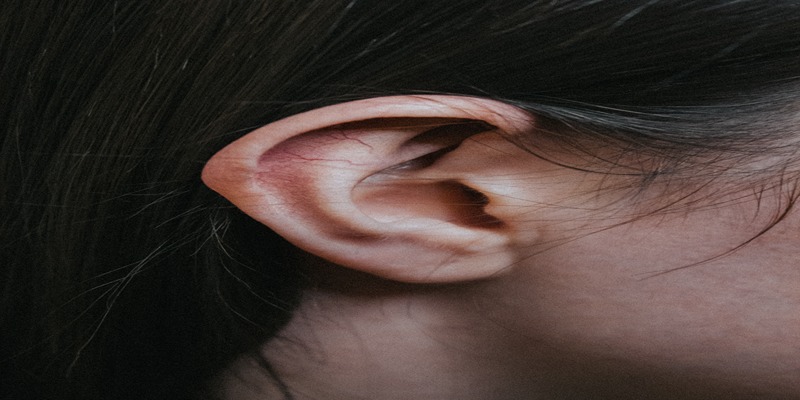If you are looking for an outdoor plant that will add color and vibrance to your garden or yard, consider begonias. These hardy plants possess several desirable characteristics, such as fast growth, bright flowers, and ease of care, making them ideal for flowerbeds, patios, hanging baskets, containers, and more!
With their lush foliage and spent blooms removed regularly, providing impressive visual impact with minimal effort. Beyond the beauty they provide us, however, many people don't realize the numerous other health-promoting benefits begonia can bring - from air purification to aiding in combating seasonal allergies.
Read on to learn more about how this vibrant addition to your garden could improve your life in various ways!
About Begonias
Begonias are a popular group of flowering plants belonging to the Begoniaceae family. They are known for their vibrant and diverse flowers, attractive foliage, and versatility in the garden and indoor settings.
Begonia Uses
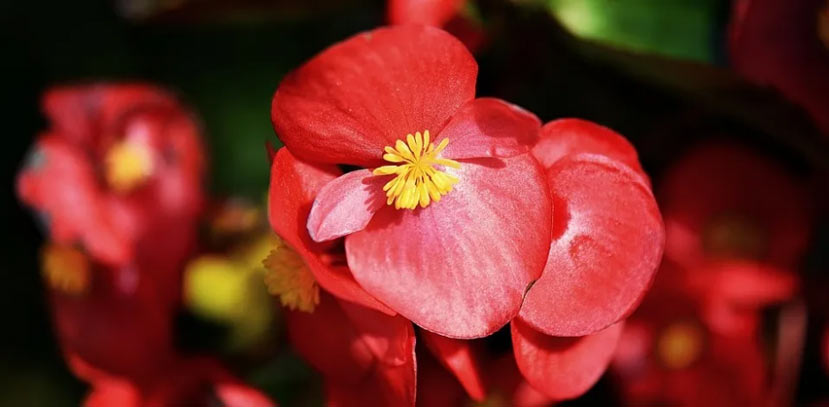
Begonias have various uses and are appreciated for their ornamental value and versatility. Here are some common uses of begonias:
Garden Decoration
Begonias are popular for garden beds, borders, and containers due to their vibrant flowers and attractive foliage. They add color and texture to outdoor spaces, creating visually appealing displays. With their wide range of sizes, shapes, and colors, begonias can be used to create diverse garden designs and arrangements.
Indoor Plants
Many begonia species and cultivars are well-suited for indoor cultivation. They thrive in the controlled environment of homes, offices, and other indoor spaces. Begonias with attractive foliage are often grown as houseplants, adding a touch of natural beauty to interior settings.
Hanging Baskets and Vertical Gardens
Begonias, particularly trailing or cascading varieties, are commonly used in hanging baskets, window boxes, and vertical gardens. Their cascading growth habit creates a graceful display of flowers and foliage, adding visual interest at eye level or from above.
Floral Arrangements
Begonias are sometimes used in floral arrangements with their showy flowers and long-lasting blooms. They can be used as cut flowers, adding color and texture to bouquets and floral displays. Begonia blooms are known for their longevity, allowing them to be enjoyed for an extended period.
Amazing Benefits of Begonia
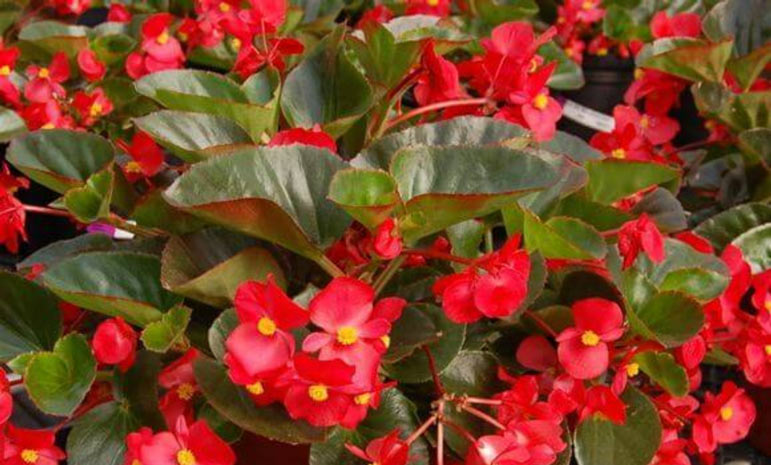
While begonias are primarily grown for their ornamental value, some potential benefits are associated with these plants. However, it's important to note that scientific research on the specific health benefits of begonias is limited.
Here are a few potential benefits that are often associated with begonias:
Ornamental Beauty
Begonias are known for their stunning flowers and attractive foliage, making them popular for enhancing the aesthetic appeal of gardens, landscapes, and indoor spaces.
Stress Relief
Being surrounded by begonias and gardening can promote relaxation and reduce stress. Taking care of plants and being in nature has been shown to positively impact mental well-being.
Air Purification
Like many other houseplants, Begonias can purify indoor air by removing certain toxins and pollutants. They can help create a healthier indoor environment by absorbing harmful chemicals and releasing oxygen.
Mood Enhancement
The presence of begonias and other plants has been linked to improved mood and increased happiness. Their vibrant colors and natural beauty can uplift spirits and create a positive atmosphere.
Connection to Nature
Growing and caring for begonias allows individuals to establish a connection with nature, even in urban settings. Spending time with plants has been associated with a sense of grounding and a closer connection to the natural world.
Therapeutic Benefits
Gardening and tending to begonias can have therapeutic effects, such as promoting mindfulness, reducing anxiety, and improving overall well-being. It provides a sense of purpose and accomplishment.
Educational Value
Growing begonias can be a great learning experience, especially for children. It teaches them about plant life cycles, the importance of caring for living things, and the joy of witnessing growth and blooming.
Aesthetically Pleasing Environment
The vibrant flowers and attractive foliage of begonias can enhance the visual appeal of indoor and outdoor spaces. Having a visually pleasing environment can positively impact mood and create a sense of tranquility.
While these potential benefits are often associated with begonias, it's important to remember that individual experiences may vary. Additionally, if you have specific health concerns or require medical advice, it's recommended to consult with a healthcare professional for personalized guidance.
Begonia Medicinal Use
Begonias are primarily cultivated for their ornamental value, and there is limited scientific research on their medicinal uses. However, in some traditional medicinal systems, certain species of begonias have been used for their potential therapeutic properties.
It's important to note that these uses are based on traditional knowledge and may not have strong scientific evidence to support them. Here are a few examples of the potential medicinal uses of begonias:
Wound Healing
Some begonia species, such as Begonia malabarica, have been traditionally used in wound healing applications. The leaves or extracts of these plants are sometimes applied topically to promote the healing of cuts, bruises, and other skin wounds.
Anti-inflammatory Effects
Certain species of begonias are believed to possess anti-inflammatory properties. In traditional medicine, extracts from the leaves or roots of these plants have been used to alleviate inflammation-related conditions, such as arthritis and joint pain.
Digestive Disorders
In some cultures, begonias have been used to address digestive issues, including stomachaches, diarrhea, and dysentery. The roots or leaves of specific begonia species have been used to prepare herbal remedies for gastrointestinal complaints.
It's important to exercise caution and consult with a healthcare professional before using begonias or any plant-based remedies for medicinal purposes. The dosage, preparation methods, and potential side effects of begonias have yet to be extensively studied, and individual reactions may vary.
It's always best to rely on evidence-based treatments and consult qualified healthcare providers for proper medical advice.
FAQs
Is it safe to eat begonia leaves?
No, it is unsafe to eat begonia leaves as they contain oxalic acid, which can be toxic if consumed in large amounts. However, small amounts of the plant may be used for culinary purposes such as food flavoring and decoration.
Are begonias good?
Yes, begonias offer a wide range of benefits. They help purify the air by absorbing carbon dioxide and other pollutants while releasing oxygen into the environment. Begonia plants are also known for their bright colors and interesting foliage that can help to add aesthetic value to any garden or home décor.
Are begonias good?
Yes, begonias offer a wide range of benefits. Low maintenance can be grown indoors or outdoors, depending on the species. They purify the air by absorbing carbon dioxide and other pollutants while releasing oxygen into the environment, which is beneficial for overall health.
Conclusion
To conclude, while the begonias plant may offer some useful benefits in treating non-allergic rhinitis, many sufferers worldwide have not tried it as a treatment. As a result, it is extremely important to discuss with your doctor before attempting to treat your condition with begonias or any natural remedy.
We hope that this blog post has provided insight into the potential benefits of using begonias for non-allergic rhinitis – so if you feel frustrated with current treatments for non-allergic rhinitis and would like to further explore the unique properties of the begonia plant for yourself, why not get started today?







